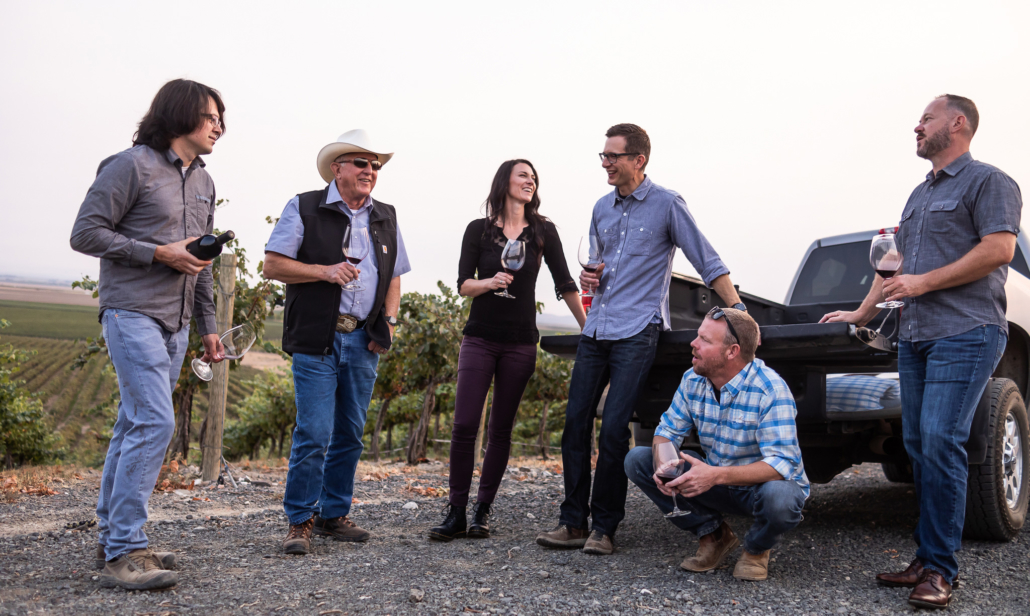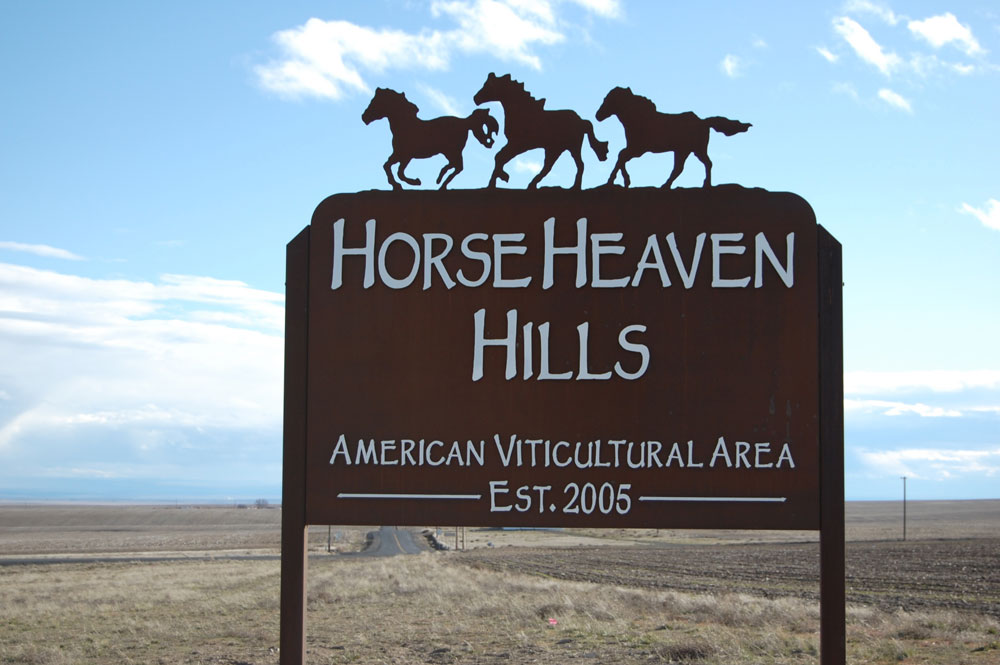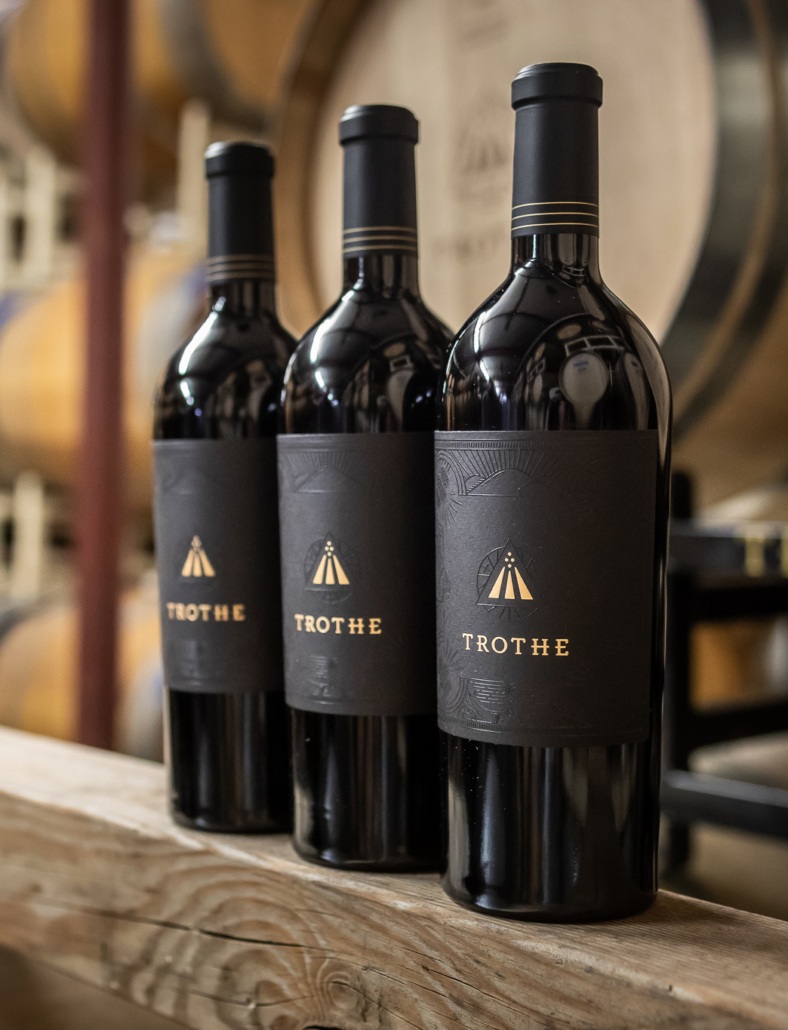Can a Cabernet from Andrews Family Vineyards
Become One of the World’s Most Sought-After Wines?
Jeff Andrews and Ray McKee are betting the ranch
that their new Trothe wine can put Horse Heaven Hills on the map.
By Ken Robertson

The release of the Andrews Family’s new Trothe wine project was cause for celebration for the team that helped bring the wine to market. Members of the team (from left to right) are: Macauley Andrews, Mike Andrews (patriarch of the Andrews Family) Jani Andrews, Jeff Andrews, Todd Chapman (vineyard manager) and Ray McKee (winemaker).
Is the world of wine ready for a world-class Washington state Cabernet Sauvignon that pencils out at $190 a bottle?
A couple of guys with deep roots in the state’s wine industry think so and are betting they can make their new venture — Trothe — into the state’s equivalent of a French premier cru using some of the best fruit grown in the Horse Heaven Hills American Viticultural Area.
The Horse Heaven Hills — a dry, high and windy range of hills that cinch up Washington’s southern border with the state of Oregon and overlook the Columbia River between Wallula Gap and the eastern slopes of the Cascade foothills — might seem an odd choice. Why not the Walla Walla or the Red Mountain AVAs?
Those two AVAs get all the attention from national and international wine critics, writers and the rest of the wine glitterati, who generally ignore the Horse Heavens, which are better known for producing a major share of the fruit used in the wines of Ste. Michelle Wine Estates, including Chateau Ste. Michelle, Columbia Crest, 14 Hands and H3.
Often also overlooked is that some incredible wines have come from the thousands of acres of wine grapes planted there.
For example, jumping back to the 2005 vintage, the folks at Columbia Crest in Paterson, WA., produced a reserve Cabernet Sauvignon using Horse Heavens fruit that in 2009 would shock the nabobs of Napa and the barons of Bordeaux. That New World upstart was named “the No. 1 Wine of 2009. Wine of the Year” by Wine Spectator.
To Jeff Andrews, the third generation of his family to tend wine grapes in the Horse Heaven Hills, that award bulwarked an idea he’d long been considering. After all, a share of the Horse Heavens fruit in that 2005 Columbia Crest Reserve Cab had come from his family’s vineyard, first planted by his dad Mike Andrews in 1994. Those were the grapes that launched Coyote Canyon Vineyard, now also known as Andrews Family Vineyards

The goal for Jeff Andrews and Ray McKee is to show consumers the potential of a region (the Horse Heaven Hills) that’s been producing excellent wines for decades and to discover how incredible its wines can be.
It was among the wines produced from those Coyote Canyon grapes that have won 90-plus awards that plaster a wall at the family enterprise and an indication of how a grower-winery relationship that started in the early 1980s can lead to wines of exceptional quality. Along the way, Coyote Canyon/Andrews Family Vineyards has grown to 1,100 active acres of wine grapes, with another roughly 200 being prepared for replanting in 2023.
To make the wine for his Trothe project, Andrews chose Ray McKee, who began learning his trade as a “cellar rat” starting at age 13 for the Stewart, Hyatt and Tefft wineries in the Yakima Valley in the 1980s. McKee jumped at the chance to work with the best fruit in the Horse Heaven Hills.
Trothe would test his winemaking skills — learned during the 10 years he was an assistant winemaker at Covey Run and Columbia Crest wineries from 1998 to 2008, and then honed during a 10-year stint as a red winemaker at Chateau Ste. Michelle from 2008 to 2018. It was a chance to work on a project based on excellence and created to produce small lots of world-class wine.
McKee knew he could draw on some of the absolute best fruit available in the Horse Heavens, fruit he’d already been working with for many years. So he jumped at the chance to set such a high goal. “It took me about a nanosecond to agree,” he has said repeatedly about Andrews’ proposal.
Andrews laid out a plan designed from start to finish to produce the best Cabernet possible from Horse Heaven fruit — “a complete expression of our vineyard, the 2018 vintage and the terroir.” He aimed to elevate the Horse Heaven Hills, “one of the most underappreciated AVAs in Washington,” and felt the time had arrived.

If you want to support the Andrews Family’s new Trothe project, you must be willing to purchase a three-bottle lot for $570. To gain access to an allocation of the inaugural 2018 vintage, register at: www.trothe.com/registration/.
“The Horse Heaven Hills is in an age of discovery,” Andrews believes, and ripe for its grape growers and for Washington winemakers to show consumers the true potential of a region that’s been producing excellent wines for decades and to discover how incredible its wines can be when the goal from start to finish is to make the best possible Cabernet Sauvignon without regard for time, effort and costs.
“We have to do everything that needs to be done exactly when it needs to be done,” Andrews said.
The foundation for Trothe’s 2018 Cabernet Sauvignon, their first effort at such excellence, is Andrews Family Vineyards’ Block 98, the same Cabernet Sauvignon vines that produced the famous 2005 Columbia Crest Reserve.
Those vines are planted in 8 to 10 inches of silty loam in the vineyard’s hottest area with the most slope, both conditions that help the grapes ripen properly and promote air drainage that promotes night-time cooling on the hottest summer days and mitigates potential frosts as the vines bud out on chilly spring mornings.
The initial release totals only 120 cases, which will be sold in three-bottle lots for $570. For the 2019 and 2020 vintages, the total production will be a little more, but quality comes first before expansion, Andrews said. Growth to about 2,000 cases annually “would be wonderful,” he added.
The resulting wine has been described as balancing floral aromatics, spice and herbs with layered black cherry, dark raspberry and blackberry fruit, all finishing with the Horse Heaven Hills signature minerality.
That 2005 Columbia Crest Reserve was described similarly: “A vivid array of black currant, blackberry, violet, black tea, and black pepper aromas and flavors that zoom through to a long, expressive finish,” Wine Spectator gushed in its review. That wine is hard to impossible to find, and one bottle’s listed price was $100.
In a recent Zoom interview, both Andrews and McKee stressed they are out in the vineyard repeatedly throughout the year, from before spring pruning until past the fall harvest, always evaluating the health of the vines, the size of the crop, the condition of the soils and how weather trends are affecting the vines, the grapes and the crop load.
McKee’s ruddy face showed evidence of the area’s trademark winds and sun, which help produce thick-skinned grapes and the tannins that help create complex wines.
The two men’s delight in their labor of love seemed to add an extra glow to the enthusiastic enjoyment on their faces. The question now is whether demanding consumers, who rightly will have high expectations for a wine they’ll pay a premier price for, will catch the same infectious delight.
They see some evidence it will happen with their Trothe wines.
“Precision lies in riding the wave of each vintage as it is occurring,” McKee said. “In a year like 2021, with its 115-degree days and 68-degree nights, “you have to walk out through the vineyards every week to watch the ground and the grapes.”
Will all their diligence, commitment and caring create exceptional wine and sell wine connoisseurs on their concept? They think it will. So far, their social media outreach is working well enough that no tasting room is planned, though they do have an area to meet with case buyers.
“I adore the interaction,” said McKee. “It’s turned out to be a great decision.”
Detailed information about the Andrews Family’s Trothe project can be found at: www.trothe.com. And if you think you’d like to buy a three-bottle lot of the 2018, inaugural vintage of Trothe, sign up to the winery’s mailing list at: www.trothe.com/registration to gain access to an allocation.
EDITOR’S NOTE: Ken Robertson, a retired newsman, has been sipping and writing about Northwest wines for more than 40 years.



